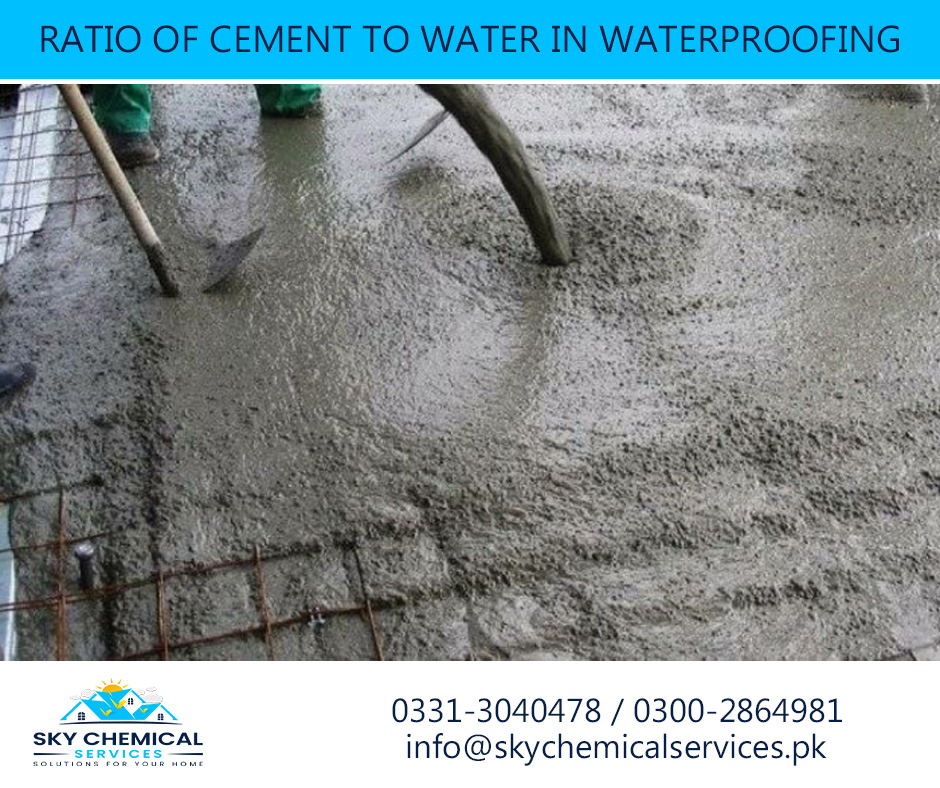
The Cement ratio of water in waterproofing is a critical factor that influences the effectiveness and durability of the waterproofing material. Waterproofing is a construction technique employed to prevent the intrusion of moisture into structures such as buildings, tunnels, bridges, and other infrastructures. It plays a vital role in maintaining and enhancing the structural integrity.
The ratio of cement to water refers to the proportion of the two components in the mixture that forms the waterproofing material. This ratio can change depending on the type of waterproofing method employed. Generally, the ratio is expressed as the weight or volume of cement to a given quantity of water.
Read More
Which Cement is Used for Roof Treatment?
How Many Layers of Waterproofing Should be Applied?
Does White Cement Absorb Heat?
Factors Related to the Mix
The selection of the appropriate ratio of cement to water is based on several factors, including environmental conditions, water pressure, and the characteristics of the waterproofing material. The primary objective of waterproofing is to create a barrier that prevents water from penetrating the structure, thereby safeguarding it from moisture-related damages such as deterioration, corrosion, mold growth, and structural weakening.
Cementitious Waterproofing
Cementitious waterproofing involves the application of a cement-based mixture that forms a rigid, impermeable barrier against water intrusion. The ratio of cement to water must be meticulously adjusted to achieve the optimal balance between the application and the final strength and durability of the cured material. An improper ratio can lead to issues like cracking, reduced adhesion, and compromised waterproofing performance.
Generally, a lower water-to-cement ratio is preferred for cementitious waterproofing. When the mixture has additional water, it may suffer from reduced density and porosity, making it more susceptible to water penetration. Additionally, a higher water content can result in longer curing times and increased shrinkage upon drying, both of which can contribute to cracks in the material.
On the other hand, an excessively low water-to-cement ratio can lead to poor workability, making it difficult to apply the mixture. This can result in voids or uneven coverage, compromising the overall waterproofing effectiveness.
The specific ratio of cement to water can vary according to the manufacturer’s recommendations, the specific waterproofing product being used, and the project’s requirements. Typically, a water-to-cement ratio ranging from 0.4 to 0.5 is common for many cementitious waterproofing applications. This range balances the need for proper workability during application with the desire for high strength and durability once the material has cured.
Read More
What is the Best Waterproofing for Concrete?
Waterproofing Basement and Walls
How to Protect Your Floor During Construction Work?
What is the Difference Between Normal and Waterproofing Cement?
Normal cement, often referred to as Ordinary Portland Cement (OPC), is used in construction projects. It offers strength and durability to structures, although it is not water resistant. In contrast, waterproofing cement is specially formulated to prevent water seepage. It contains additives that enhance water-resistant properties and reduce the risk of leaks and dampness. While normal cement provides strength, waterproofing cement prioritizes impermeability, making it ideal for structures exposed to moisture like basements, bathrooms, and water tanks.
The key distinction lies in their intended applications: normal cement for general construction, and waterproofing cement for areas prone to water exposure.
Conclusion
The ratio of cement to water in waterproofing is a crucial consideration that significantly impacts the success of the waterproofing application. The careful selection of this ratio ensures that the waterproofing material possesses the necessary properties to effectively resist water intrusion, enhance structural longevity, and prevent moisture-related damages. Balancing workability, strength, and durability is key to achieving optimal results in waterproofing projects. As such, consulting manufacturer guidelines and industry best practices is vital to determining the appropriate ratio of cement to water for each specific waterproofing application.
If you want to know more about cement and its applications, contact Sky Chemical Services, the best company in Karachi, Pakistan.
